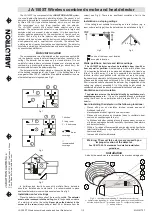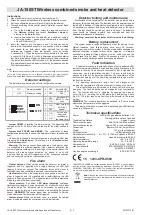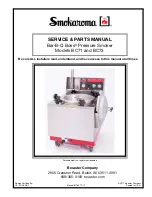
JA-150ST Wireless combined smoke and heat detector
JA-150ST Wireless combined smoke and heat fire detector
2 / 2
MLW51707
Instructions:
1. Open the detector cover, by turning it anti-clockwise (1).
2. Attach the removed plastic base to the desired place with screws.
3. Set the configuration jumpers (6) according to the table below.
4.
Proceed according to the control panel installation manual. Basic
procedure:
a.
Go to the
F-Link
program, select the required position in
the
Devices
window and launch
Enrollment mode
by
clicking on the
Enroll
option.
b. Insert all batteries into the detector, an enrollment code is
sent to the system – sending is confirmed with a short flash
of the LED indicator (3).
5. Insert the detector into the plastic base. The detector can be
inserted into the plastic base only in one position, which is marked
with arrows (4) on both plastic parts, provided that all three
batteries are inserted. Close the detector cover by turning
it clockwise (2). When the detector is fully secured to the base,
a control LED lights up (3), which indicates an automatic detector
test. During this period of time, the detector doesn’t detect anything.
The test ends when the LED shuts down (3), the detector becomes
fully operational. A possible detector fault may be indicated, see the
Fault indication
chapter.
Note:
The detector can also be enrolled into the system by entering its serial number
(5) in the F-Link program or on a keypad (or using a bar code scanner).
All numbers stated under the bar code shall be entered (1400-00-0000-0001).
Detector settings
The detector properties can be set with configuration jumpers.
1
ON
Memory disabled
2
OFF
Smoke(EN 54-
7) or heat (EN
54-5)
OFF
Memory enabled
3
OFF
ON
OFF
2
OFF
Smoke only
(EN 54-7), (not
heat)
3
ON
2
ON
Heat only (EN
54-5) (not
smoke)
3
OFF
2
ON
Smoke and
heat (both
conditions at
the same time)
3
ON
Jumper 1 MEM
- Signalling the alarm memory. The signalling LED
remains active for 24 hours after the reason for the alarm ceases to
exist.
Jumper 2 and 3 TEMP and SMOKE
- The combination of these
configuration jumpers defines how the detector will react to smoke and
heat.
It’s possible to change the system’s reaction to something other than
Fire using the
F-Link
program. This setting is in the
Reaction
options
in the
Devices
window.
Warning:
This device cannot be considered a fire detector when
it’s configured to a different reaction. Upon detector activation, the
system signals accordingly to the settings of the control panel. The
detector will always signal activation by smoke or heat with
a quickly flashing red LED regardless of the configured reaction
and the control panel status (set/unset/service).
Fire alarm
Optical detector:
When smoke enters the detector, an alarm is
triggered, and it is signalled with a rapidly flashing red LED light
(approx. 8 times per second). The indication lasts until the room is
ventilated (thus also ventilating the detector’s detection chamber).
Heat detector:
When the temperature rises above a set limit, an
alarm is triggered, and it is signalled with a rapidly flashing red LED
(approx. 8 times per second). The indication lasts until the temperature
drops (e.g. when the room is ventilated).
Alarm memory:
If enabled,
LED alarm indication
continues
flashing slowly (approx. 4 times per second) for a further 24 hours after
the alarm stops. The indication can be terminated by opening the
detector cover by turning it anti-clockwise and activating the tamper
sensor.
WARNING!
The control panel must be switched to Service
mode otherwise a Tamper alarm will be triggered.
Tamper alarm:
When the detector cover is opened, the tamper
alarm is activated unless the control panel is in Service mode.
Detector testing and maintenance
Functionality of the optical part of the detector can be tested with a
test spray for smoke detectors. The functionality of the heat part can be
tested with a hairdryer. If the detector is configured to both conditions,
it’s necessary to conduct both spray and hairdryer tests at the same
time. The test should be carried out once in 30 days. The detector’s
cover should be cleaned regularly from cobwebs and dust. No
additional maintenance is necessary.
Warning: never test the detector with fire inside the building.
Battery replacement
The system sends a report automatically when the battery is low.
Optical indication then flashes briefly once every 30 seconds.
Remember to switch the system to Service mode before changing the
batteries otherwise a tamper alarm will be triggered. It is always
essential to replace all three batteries. Use the same type and the
same brand for all of them. Wait for 90 seconds in order to let the
detector’s circuitry discharge before inserting new batteries.
Fault indication
The detector checks its functionality. When a fault is detected, LED
indication immediately flashed 3 times and then briefly 3 times every 30
seconds (a failure of the automatic functionality test is signaled the
same way, see the
Installation
chapter). The error found may be
caused by a fault of the detection chamber, the temperature of the
environment being out of the operating temperature range or other
faults of the detector.
An operating temperature range fault will disappear the
moment the temperature of the environment turns back to normal.
Other faults found are indicated as a fault even after their cause
has gone. The fault indication can be stopped by the functionality
test. The functionality test is triggered by opening the detector
cover (fig 6-1), removing the lower plastic part and putting it back
(fig 6-2). If this test results in a fault, send the detector to the repair
service.
WARNING!
The control panel must be switched to Service mode
otherwise a Tamper alarm will be triggered.
The detector will alert you in case of low batteries by an LED flashing
once every 30 seconds.
Technical specifications
Power
3x LR6 (AA) type alkaline batteries, 1.5 V
Warning: batteries are not included
Typical battery lifetime
approx. 3 years
Communication band
868.1 MHz, Jablotron protocol
Communication range
approx. 300 m (unrestricted area)
Dimensions
diameter 126 mm, height 50 mm
Weight
142 g (without batteries)
Smoke detection
optical light scattering
Smoke detector sensitivity
m = 0.11 - 0.13 dB/m pursuant to EN 54-7
Heat detection
class A2 according to EN 54-5
Alarm temperature
+60 °C to +70 °C
Operating temperature range
-10 °C to +80 °C
Complies with
EN 54-5, EN 54-7, EN 54-25
Also complies with
ETSI EN 300220, EN 50130-4
EN 55022, EN 60950-1
Can be operated according to
ERC REC 70-03
15 1293-CPR-0508
JABLOTRON ALARMS a.s. hereby declares that the JA-150ST is in a compliance
with the relevant Union harmonisation legislation: Directives No: 2014/53/EU,
2014/35/EU, 2014/30/EU, 2011/65/EU. The original of the conformity assessment
can be found at www.jablotron.com - Section Downloads.
Note:
Although this product does not contain any harmful materials
we suggest you return the product to the dealer or directly to the
producer after use.




















